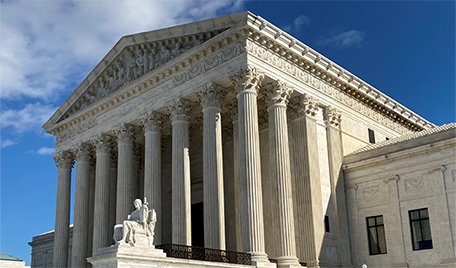A divided Supreme Court on Friday ruled that a Maryland public school board likely violated the First Amendment rights of parents who wished to have their children excused from classroom instruction that includes LGBTQ+ storybooks.
 In Mahmoud v. Taylor, Justice Samuel Alito, writing for a 6-3 majority, determined that parents challenging the school board’s decision to withhold parental opt-outs were entitled to a preliminary injunction and that they were likely to succeed in proving that the board’s policy burdened the free exercise of their religion.
In Mahmoud v. Taylor, Justice Samuel Alito, writing for a 6-3 majority, determined that parents challenging the school board’s decision to withhold parental opt-outs were entitled to a preliminary injunction and that they were likely to succeed in proving that the board’s policy burdened the free exercise of their religion.
A group of parents in Montgomery County, Md., sued the county’s education board after the board changed its prior policy of sending parental notifications to parents when materials such as Pride storybooks were discussed in class, with the option of teachers substituting other materials if requested by the parents.
The petitioners in the lawsuit included parents of the Muslim, Roman Catholic, and Ukrainian Orthodox faiths, and an unincorporated association formed to protect parental opt-out rights in the Montgomery County schools.
“The Board’s introduction of the ‘LGBTQ+-inclusive’ storybooks, combined with its decision to withhold notice to parents and to forbid opt outs, substantially interferes with the religious development of petitioners’ children and imposes the kind of burden on religious exercise that Yoder found unacceptable,” Justice Alito wrote. “The books are unmistakably normative. They are designed to present certain values and beliefs as things to be celebrated, and certain contrary values and beliefs as things to be rejected.”
In Wisconsin v. Yoder (1972), three members of the Amish faith challenged a Wisconsin state law requiring all children to attend public school until age 16. The Court held that the law violated the First Amendment’s Free Exercise Clause.
Because the school board policy burdened the parents’ religious beliefs, Alito said the policy was subject to a strict scrutiny test where the policy must advance “‘interests of the highest order’” and must be “narrowly tailored to achieve those interests.” He said the school board’s policy of permitting opt-outs “in a variety of other circumstances” undermined that argument.
In his concurrence, Justice Clarence Thomas agreed that the Yoder precedent applied in this case. “The Board’s exclusion of traditional religious views, coupled with a curriculum that ‘pressure[s] [students] to conform … constitute an impermissible attempt to ‘standardize,’ the views of students,” Thomas wrote, citing the Yoder decision.
Justice Sonia Sotomayor, in a dissent joined by Justices Elena Kagan and Ketanji Brown Jackson, warned that the decision’s impact on the public education system could be profound.
“The result will be chaos for this Nation’s public schools. Requiring schools to provide advance notice and the chance to opt out of every lesson plan or story time that might implicate a parent’s religious beliefs will impose impossible administrative burdens on schools,” she concluded. “The Court, in effect, constitutionalizes a parental veto power over curricular choices long left to the democratic process and local administrators.”
How the Case Arrived at the Court
Initially, a district court rejected a request for a preliminary injunction against the school district. A divided Fourth Circuit Court of Appeals concluded that there was no First Amendment religious freedom burden on the parents since they were not coerced to change their beliefs or what they instruct their own children. However, a judge in the Fourth Circuit dissented, pointing out that the Montgomery County school district had a religious diversity policy that gave the school “discretion to grant religious opt-out requests.”
In their petition to the Supreme Court, the parents noted there was a split among federal appeals courts when presented with the question of compelled participation in public school instruction as a free-exercise burden. They also believed the Fourth Circuit did not correctly apply several landmark decisions, including Wisconsin v. Yoder.
The Justices accepted the appeal in January 2025, limited to the following question: “Do public schools burden parents’ religious exercise when they compel elementary school children to participate in instruction on gender and sexuality against their parents’ religious convictions and without notice or opportunity to opt out?”
In its brief to the Supreme Court, the state argued that no credible evidence of coercion had been presented in the lower courts. Citing legal precedent and the Constitution, it argued that the Court’s precedents held that “parents who choose to send their children to public school are not cognizably coerced by virtue of their children’s exposure there to religiously objectionable ideas.”
In its brief, the state also agreed with the Fourth Circuit Court of Appeals that the petitioners were relying on an overly expansive reading of Yoder to state their case. But in the end, the Supreme Court’s majority gave Yoder and related cases much more weight in their decision.
Scott Bomboy is the editor in chief of the National Constitution Center.







